
Part 2 MARK STATMAN: MEXICO AND THE POETRY OF GRIEF AND CELEBRATION
Part 2 of my interview with Mark Statman looks closely at Mark’s Latin American poetic influences, his life in Mexico and ends with an extract
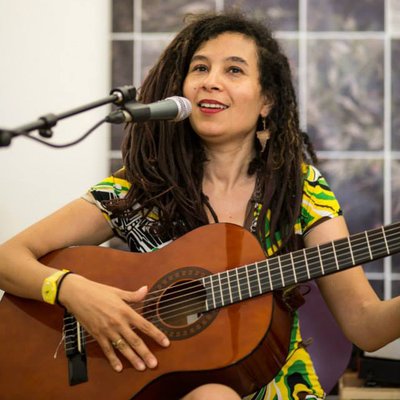
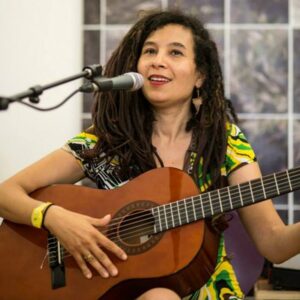
I interviewed Cina Aissa, who is is a multimedia artist, musician and storyteller, using the gifts of neurodivergence and disability to make the world a better place. Cina says about herself, “I currently live in London where I’m kept busy separating my fighting cats.”
Leslie: What are the most important personal stories that lie behind your self-description as a ‘disabled artivist and migrant’ please? How have these experiences shaped your core values?
Cina: I never used to describe myself like that but with my 40th anniversary, a few years ago, a real weariness settled upon me and I realised I had run myself to the ground over four decades, trying to be a ‘good girl’ and not getting anywhere. My oppression had been a three-dimensional cloak that had become so tight and heavy that I could not remove it without consequently flaying my own skin. That is why I write or ‘right’ as I like to describe it: to recall my lived experience and give society a chance to look at itself in and for the way it treats vulnerable people. My ‘righting’ is also a vindication on behalf of my peers who are disabled, each one with an incredible story of survival and resilience that makes them incredible people. My ‘outing’ my own experiences will hopefully encourage others like myself to put their stories out there: I want to read them! ‘Disabled’ is also a label that has grown stronger over the years. It testifies to all the ways society has erected barriers and left me (and those like me) out. In practice, that’s linked to learning differences I have had since I was a child that were labelled as several mental health conditions. With age, physical symptoms have appeared and fatigue has taken hold of my body also.
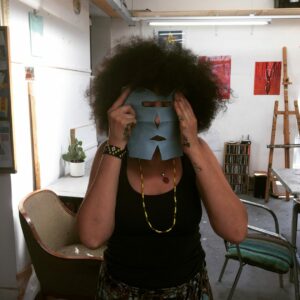
‘Artivist’ is a title I baptised myself with after using art to emancipate myself of my burdensome lived experience, a sort of coming of age. I stopped running away from myself and started listening to what I had to say instead of dismissing it because the world told me I was mad. I work in museums and galleries, often engaging with the types of people who face multiple barriers in accessing art and culture, like myself. My work is to highlight the creativity that lies dormant in individuals burdened by economic distress, disability and a myriad of ways to be ‘othered’ ranging from sexual orientation, age, skin colour, religion, etc.. I could very well be a participant myself and I am reminded of that often, for example when arts organisations are delighted by my intersectionalities but would not give me a job higher than a zero hour contract or even better for them, as a volunteer.
I call myself a migrant because I am frequently reminded that I’m not from around here and even though I was born in France, I get asked where I am really from when I am over there too. I call myself a migrant as I stand in solidarity with all migrants and understand their plight, the difficulties one encounters due to your face, your hair type, your surname. I have become comfortable with these three identities: that of a disabled for that’s how I am, that of an artivist, for that’s what I do and that of a migrant, for that’s who I am.
Leslie: You have experienced racial injustice in the art/museum world. Why is the sector sometimes elitist and discriminatory like this?
Cina: I do not wish to go into what has happened to me again as I have already written about the two liminal experiences which have led me to disengage from mainstream arts and pursue my own path.
The arts are a very risk averse sector which will only walk down a path after it has been sanitised/made safe and canonised by money, famous art critics and elitist gatekeepers, mainly white, rich and male but also females (there are a lot of white female gatekeepers in the arts but that’s another story for another day). I have seen lots of elitism and discrimination happening in the arts. A person like myself is seen as a ‘risk’ for my skin colour, my opinions and my intellect. I cannot wear my afro for an interview as I would come across as ‘difficult’ to a white middle class female manager with 2.4 children, a husband, a dog and a mortgage. She wants to have an easy life and when she sees me, she feels challenged before I have even said anything. Don’t ask me why but that is just the way things are. In London, UK and 2020. Employing a meek white kid (possibly coming through sideways via an internship arranged for an old friend’s daughter) is a much safer bet and will evolve into a comforting beige employee* who drinks a bit too much at week-ends.
I’m not white, I’m not beige and I don’t drink… that’s a lot going on against me, don’t you think?
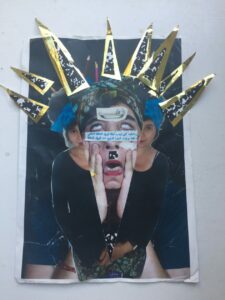
Leslie: Can you describe The Free Space Project, how it came about, its purpose and what you put into it. What have you learned from this project?
Cina: I had a nervous breakdown at the beginning of 2014 as the result of single-handedly facing being bullied at work and both my children being bullied at their secondary school. I had never felt so powerless and lost so many things in 2014 that I call it my ‘ground zero’ year. As my ruminations took hold, I reviewed all my failings as a human being and realised that I’d missed my daughters’ childhoods, as I had been so stressed out and busy surviving as a single mum. That really broke my heart and I wanted to take myself back to a space where I could be around babies again. I had been an early years librarian so I was used to singing to babies. This time, however, I was mainly singing to myself and to the parents and carers in the room. I was struggling with my mental health more than ever and with hindsight, I suppose I was singing to soothe myself. At that time, my kids were 14 and 17, so I felt like I could be of help to parents of younger children, support them, talk to them and signpost them to services. I had seen how badly my own children had been affected by our lack of a community, so I decided to get better, not bitter, and I set up this group to create a sense of the community I wish I had had around me when my kids were small.
Overall, running this group gave me a sense of purpose when I was at my lowest and I am satisfied that I have managed to create a network of parents who care for each other and I have made kindness cool again. This was very healing after what my family had been through for being different. It was also healing for me to look into the eyes of babies and see the potential in the future generations and remember that children are born free of prejudice but sadly quickly learn it through the media, society, and sadly also, sometimes through their own families’ populist values, as in the case of the my daughters’ bullies. Our inclusive group has welcomed all sorts of parents and carers: same sex parents, parents with visible and non-visible disabilities, parents and children of colour, Muslim families, non-English speakers, Jewish families, atheists, grandmothers and awkward dads, so I am happy that these little ones would have interacted with other children and types of families as a first life experience, hopefully learning how healthy diversity is, so that there’s no need to pick on someone else in the future.
Sadly, the Baby Singalong, which has been going on for the past 6 years and on zoom throughout the pandemic, is coming to an end as it really only works as a face-to-face group, hopefully restarting in Spring 2021 when we may be back at the health centre. I continue to support local parents as a peer local mama on an informal basis.
Leslie: What are the grassroots campaigning groups you’re part of? How have they changed you in small (or larger) ways?
Cina: I am a member of Museum Detox (MD), a network for People of colour working studying/volunteering in museums and galleries and being part of this network has helped me to appreciate how much I have to offer. The network has helped me find my voice and has helped me feel less isolated in a sector that can be so cold and ruthless. It has helped me find allies and has comforted me in the fact that my experiences have been shared by others and that I am believed, supported and accepted by my peers and friends in MD however badly my employers treat me. I am also a member of several grassroots disability groups such as DPAC and Mental Health Recovery Network, though I am not very active in those networks, I have learnt a lot from them and have been struck by witnessing the incredible contributions of their activists, the late writer Robert Dellar and late survivor poet Razz, Denise McKenna, Debbie McNamara and Paula Peters, to name but a few. I love the disability warriors who put their lives on the line to shine a light on how this country treats its most vulnerable. They are the first spaces where I have performed original material and have been instrumental in getting me to put my voice out there. They were the first ones to listen to me.
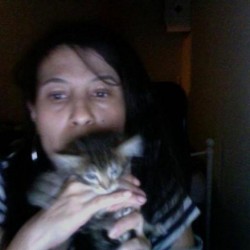
Leslie: Where do you draw your positivity from? What keeps you going and gets you out of bed every day?
Cina: I stay positive by counting my blessings everyday, sometimes even doing a written gratitude list but mainly just taking some time out daily to reflect on the good that is. I try to pray and meditate everyday to keep me positive.
I also like to have a laugh and I live with two very special creatures from outer space: my cat, Pipsqueak, who is the butt of many of my jokes, and his hateful Maine Coon of a mother Cherie, who looks down on us like we’re plebs, so I’m never bored with these two and the jokes keep on coming thick and fast.
What keeps me going is the fact that my work is not about me, it’s not for me either, it’s for all of us. I may feel rubbish and want to stay in bed but my ancestors soon remind me that I am standing on the shoulders of giants and that I need to use my privileges (mainly, the hard won education some of my family members did not have access to) to help the village, ie: others. So here I am, using all that I have to make some noise and ‘right’ my stories, the stories of so many of us.
*one can be a beige employee and have pink hair, these are not mutually exclusive.
Next week I interview systems engineer and children’s author Suzie Olsen who performs various science, technology, engineering, art and math experiments with her family.
ABOUT LESLIE TATE’S BOOKS:

Part 2 of my interview with Mark Statman looks closely at Mark’s Latin American poetic influences, his life in Mexico and ends with an extract

I interviewed international poet and translator Mark Statman about Volverse/Volver, his 14th published collection. Mark, who has won national arts awards, is Emeritus Professor of Literary

I interviewed Lisa Dart, finalist in the Grolier, Aesthetica and Troubadour Poetry Prizes and author of The Linguistics of Light (poems, Salt, 2008), Fathom (prose

I interviewed writer Julia Lee Barclay-Morton about her experience of autism. Julia began as an experimental dramatist in New York, moving to the UK to

I interviewed Gillean McDougall from Glasgow, who edited the collaborative projects Honest Error (on Charles Rennie Mackintosh and his wife Margaret Macdonald) and Writing the
| Cookie | Duration | Description |
|---|---|---|
| cookielawinfo-checkbox-analytics | 11 months | This cookie is set by GDPR Cookie Consent plugin. The cookie is used to store the user consent for the cookies in the category "Analytics". |
| cookielawinfo-checkbox-functional | 11 months | The cookie is set by GDPR cookie consent to record the user consent for the cookies in the category "Functional". |
| cookielawinfo-checkbox-necessary | 11 months | This cookie is set by GDPR Cookie Consent plugin. The cookies is used to store the user consent for the cookies in the category "Necessary". |
| cookielawinfo-checkbox-others | 11 months | This cookie is set by GDPR Cookie Consent plugin. The cookie is used to store the user consent for the cookies in the category "Other. |
| cookielawinfo-checkbox-performance | 11 months | This cookie is set by GDPR Cookie Consent plugin. The cookie is used to store the user consent for the cookies in the category "Performance". |
| viewed_cookie_policy | 11 months | The cookie is set by the GDPR Cookie Consent plugin and is used to store whether or not user has consented to the use of cookies. It does not store any personal data. |